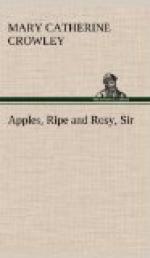“Not what we give, but what we share;
For the gift without the giver is bare.”
And then the mother’s hands rested lovingly a moment upon Tom’s head, as again she repeated more softly: “No, certainly.”
* * * * *
As Widow Barry had surmised, the keynote of Tom’s nature was that he was easily led, and therein rested the possibilities of great good or evil. The little confidential chats with his mother were a strong safeguard to him, and laid the foundation of the true principles by which he should be guided; but, as he mingled more with other boys, he was not always steadfast in acting up to his knowledge of what was right, and was apt to be more influenced by his companions than his best friends cared to see him. At present he was inclined to make a chum of Ed Brown, who, though only a year older, was so precociously shrewd, and what the world calls “smart,” that, according to good Widow Barry’s opinion, “he could buy and sell Masther Tom any day.”
The old woman had, indeed, many opportunities for observation; for is not sometimes so simple a transaction as the buying of an apple a real test of character? If a boy or man is tricky or mean or unjust in his business dealings, is it likely that we shall find him upright and honorable in other things? Though Mrs. Norris was not as well posted as the apple-vender, one or two occurrences had caused her to positively forbid Tom to have any more to do with Ed,—a command which he grumbled a good deal about, and, alas! occasionally disobeyed.
But to continue our story. The following Saturday morning the skies were blue, the sun shone bright, the gladness of spring was in the air,—all promised a long, pleasant holiday. The apple stand at the corner had a prosperous aspect. The umbrella, though shabbier and more rakish-looking than ever, wore a cheery, hail-fellow-well-met appearance. Widow Barry had, as she told a neighbor, “spruced up her old bonnet a bit,”—an evidence of the approach of spring, which the boys recognized and appreciated. Now she was engaged in polishing up her apples, and arranging the peanuts as invitingly as possible; a number of pennies already jingled in the small bag attached to her apron-string, in which she kept her money.
“Ah, here comes Masther Tom!” she exclaimed, presently. “An’ right glad I am; for he always brings me a good hansel.”
“Hello, Missis Barry!” cried he. “How’s trade to-day? Too early to tell yet? Well, see if I can’t boom it a little. Give me a dozen apples, and one—yes, two quarts of nuts.”
Pleased and flustered at this stroke of fortune, she busied herself in getting out two of the largest of her paper bags, and filling the munificent order. But Tom was not like himself this morning. He had plenty to say, to be sure; but he talked away with a kind of reckless gaiety that appeared a trifle forced, and he was eager to be off.




